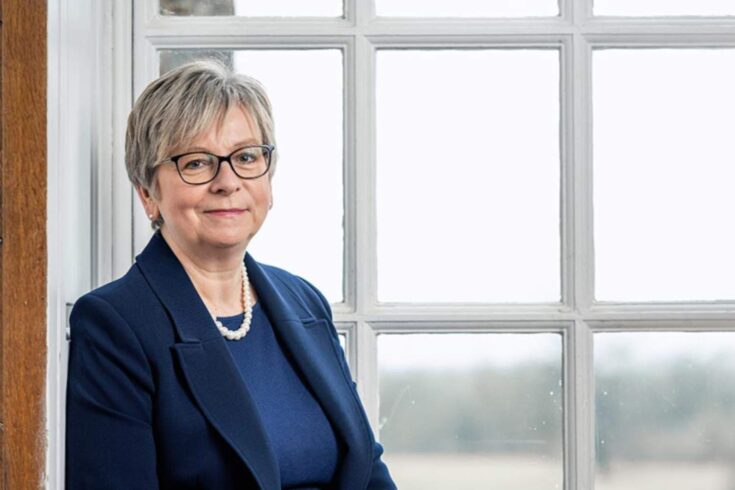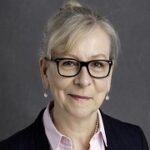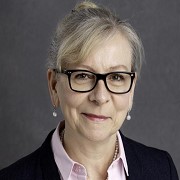Failure is a feature of everyone’s life, but we don’t generally talk about it enough.
I failed my 11 plus exam, I had to re-sit A-level physics, I failed to get into medical school. It helps people to talk about failures because it means that they don’t feel that they’re the only one failing. Just try and get back up, learn from it and do things differently.
Non-academic beginnings
My biggest aspiration when I was young was how well I could roller skate. We had a very steep drive on our house made up of paving slabs, which went straight into the road (a quiet cul-de-sac). Every time I got a bit braver, I’d move up to the next slab.
I didn’t have any experience of people who went on to do anything academic at all. My dad started life as a carpenter. My school wasn’t academic. I wasn’t supported to take GCSEs in chemistry, maths, physics or modern languages.
I left at 16 and worked in a corner shop, which I enjoyed very much. And it was there that I came across a notice in the shop for a dental nurse, in a surgery two doors up.
Juggling nursing and studies
I went to night school once a month to learn to be a dental nurse while single-handedly running the surgery for the dentist. By that time, I knew that I liked and wanted to serve people and the community. As a result, I left the practice to do general nursing training.
I had a eureka moment when I was a nurse. Six months in, watching junior doctors taking medical histories from patients, I thought I want to do that.
I was determined but clearly under-qualified, and went to evening classes to do my GCSEs in chemistry, physics and maths and then qualified as a general nurse. I specialised in end-of-life care, while juggling A levels in biology, chemistry and physics at a technical college, part-time.
The power of education
My most important career moment was getting into medical school. But I was rejected two years running.
Undeterred, I phoned the University of Southampton, my first choice, and said, “Can I come and see you and explain why I want you to take me?”. They offered me a visit and I had to write a 400-word essay on why I thought I should go. I wish I’d kept it!
If you give people the chance to get into university, then the power of that for social mobility is incredible. The power of education revolves around social mobility for me, and that journey starts at school. Education is so important to your start in life, you can’t assume that people get this at home.
Route into genetic sequencing
I worked in Thailand for seven years, studying infectious diseases of the rural poor. When I came back to the UK in 2009, I couldn’t study the same diseases. I knew people who were doing pathogen sequencing and were very animated about its potential. And I thought, how could this translate into practice to bring benefit for patients?
I’d describe what I do now as forensic genetic detective work. I think about how we can use genetic sequencing of common bacterial pathogens to better understand how to detect and halt disease outbreaks.
Setting up the COG-UK consortium has been instrumental in my recent history. It played a pivotal role in the pandemic, generating genome data on the SARS-CoV-2 virus from across the UK to better understand and detect variants of concern.
We need to learn from this and prepare for, detect, and contain the next pandemic challenge. We can also combine the data with human genomes, to understand why some people with coronavirus (COVID-19) have severe disease, while others do not.
Advocating for equality, diversity and inclusion
I’ve always been an active mentor of women. When we assembled the scientific team that led COG-UK, the leading academics were predominantly men. We had to make rapid decisions, take rapid action and do the best we could.
But during that rush I felt I hadn’t given enough attention to equality, diversity and inclusion (EDI). So I came up with the idea of a network to share experiences and knowledge and to promote science careers in women and girls, called Women in COG.
Universities can make a big difference to women by promoting them. My university asked me to apply to the MRC Millennium Medal. And I thought if they’ve got confidence in me, I’d better do it. I think women do have to be encouraged to put themselves forward and that’s where mentoring can make a difference.
EDI is all about personal action. We should all feel able to say something. For example, if there’s a room full of men, it should be natural to say, “Where are the women here?”. But it’s not always easy to start this conversation. For action to happen we have to start talking about it at a very young age, so that such questions become normalised.
Believing in yourself
It’s important not to rewrite history and realise that careers and decisions can be quite messy and random. Many successful people never started out with a long-term plan, and taking opportunities as they arise means that you are not on a straight path. Have belief in yourself and if you want something then feel empowered to ask.
My message to funders is to support a broad spectrum of research because you can’t predict what’s going to be important in the future. A good example is COVID-19 vaccine development, which has been built on decades of past research. And to young scientists, choose to work on a subject because it excites you and triggers your curiosity.
Find out more
Learn more about the work of COG-UK.
Career in brief
Professor’s Sharon Peacock’s career history:
- studied medicine at the University of Southampton
- Wellcome Trust research training fellowship in microbiology in 1995, specialised in clinical microbiology
- Wellcome Trust Career Development Award in Thailand in 2002
- received Medical Research Council (MRC) funding to research real-world applications for pathogen genomics since 2011
- awarded a CBE for services to medical microbiology in 2015
- became Executive Director and Chair of the COVID-19 Genomics UK (COG-UK) consortium in 2020.
Top image: Credit: Professor Sharon Peacock




